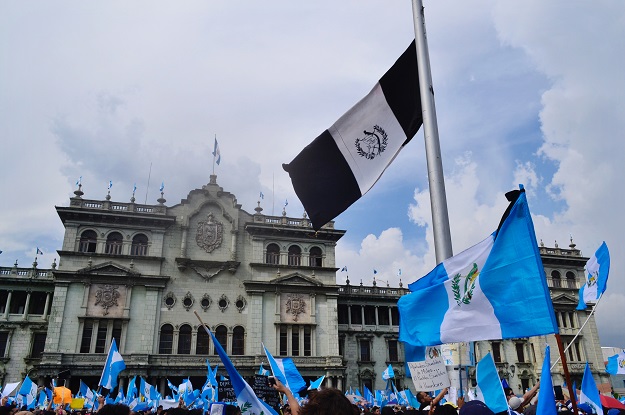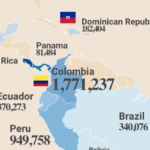This article has been updated.
It took more than 20,000 protesters marching in the streets of Guatemala City to force then-President Otto Pérez Molina to resign and face corruption charges in 2015.
Two years later, Pérez Molina is gone – but the thousands of anti-corruption protesters are back, and they’re taking aim at the new president, Jimmy Morales; at Congress; and at anyone else that stands in the way of their message: no more corruption. The fight against entrenched structural graft and impunity in the country is at a turning point; protesters’ return to the streets en masse on Sept. 20 was a clear sign that, although politicians may not have realized it, the population remains steadfast.
Citizens’ demands at a key moment like this could be deciding factor in determining Guatemala’s direction, said Gustavo Berganza, a sociologist and political analyst.
“The pressure remains over Jimmy Morales,” he told AQ. “Now or in the near future, he will be held accountable.”
Some 200,000 Guatemalans took part in a general strike calling for the resignation of over one hundred Congressmen they say are trying to shield President Jimmy Morales from his own corruption investigation. With international and local prosecutors on their side, the marchers hope popular pressure will again help them hold their leaders to account.
There is early evidence their actions are having an impact. The size of the strike may help widen fissures between Morales and his supporters in Congress, according to political analyst Daniel Haering.
“In upcoming days, lawmakers will try to assuage popular pressure by voting again to remove Jimmy Morales’ immunity, but it remains to be seen whether they will be able to garner the needed votes,” Haering told AQ. “His party is well aware that this is a matter of survival.”
Student associations, workers unions, and small businesses took part in the strike. By mid-afternoon, protesters had raised a black version of the Guatemalan flag in the capital’s main square. Local media reported on concentrations of peaceful protesters in several cities and towns throughout the country.
“The worst possible scenario is to let these members of Congress continue legislating,” said Gabriel Wer, a founder of JusticiaYa, the advocacy group that organized the protest.
In the fallout of the protest, a lawmaker brought the request to lift Morales’ immunity once again before Congress, but the effort failed. But the pressure on Morales may be working. More than twice as many lawmakers voted for stripping the president of his immunity than in the prior attempt, and there weren’t enough votes in the president’s favor to shelf the request entirely.
Over the past three weeks, several protests have been held against Morales and party leaders in Congress, who many view as having together stalled the country’s anti-corruption efforts.
At the heart of the matter is the UN-backed International Commission against Impunity in Guatemala (CICIG), which since 2007 has participated in graft investigations into dozens of public officials.
Morales was supportive of CICIG when he came into office last year, but has since framed its widening investigations as an infringement on Guatemala’s sovereignty. In August, he accused lead investigator Ivan Velásquez of exceeding his mandate by “involving himself in the internal affairs that are the responsibility of the state of Guatemala.”
The move was widely seen as a response to the opening of an investigation by CICIG and the attorney general’s office into illegal contributions to Morales’ presidential campaign. The Constitutional Court acted quickly and forced Morales to backtrack.
Since then, lawmakers have worked to shield Morales and themselves from the investigation’s potential blowback. Last week, Congress refused to remove the president’s immunity. Lawmakers then passed two reforms to the penal code tailored to protect party leaders from allegations of breaking campaign finance rules. The Constitutional Court, again, forced them to backtrack, saying that the amendments, which would have eliminated the campaign finance rules and allowed some criminals serving sentences of less than 10 years to walk free in exchange for a small fine, undermined the rule of law.
But Morales now appears to be pursuing other avenues to legal protection. His allies in Congress are said to be mulling a reform that would allow him to fire Attorney General Thelma Aldana. At the United Nations General Assembly on Sept. 19, Morales also announced his intention to revise CICIG’s constitutive agreement.
The Sept. 20 strike was the largest public protest since Morales declared Velásquez persona non grata and tried to expel him from the country just over three weeks ago. JusticiaYa, the group that organized the protest, is demanding the resignation of the legislators who voted for the reforms to the penal code. It is also demanding Morales’ resignation on the grounds that he has obstructed justice, since no investigation can move forward if he preserves his immunity.
“The amnesty decrees are not isolated actions,” said Wer. “They’re part of a larger strategy from Congress and the president to stop the anti-corruption movement.”
The resignation of various legislators, activists say, would give new life to several bills that have floundered in Congress over the past few months. That includes a reform to the electoral system, which would reduce barriers for new parties to compete for office and ensure increased transparency in party finance. Haering, the political analyst, said there is a real chance that the large protests could achieve this goal.
“With increased international and societal pressure … we might have a chance at seeing at least a few of the most questioned Congressmen forced out of office, which could pave the way for passing the electoral law in due time for the upcoming election,” he told AQ.
Change won’t come easy, however. Morales and his allies have clamped down on dissent. Albavision, a national TV company, has framed recent protests as violent and unwarranted. On Sept. 15, police forces threw tear gas to put an end to a six-hour demonstration outside of Congress.
Independent media, for their part, have come under attack. Cable operators in rural areas of the country have blocked the cable signal of Guatevision, a privately-owned TV channel that has adopted a critical stance throughout the crisis.
Online news site Nómada was also targeted by a massive cyberattack attack on Sept. 11. According to its director, Martín Rodríguez, the attack started just two minutes after they published a story on a $6,800 check from the armed forces that Morales cashed in addition to his presidential salary. It was later reported he received a total of $61,200 in such bonuses.
Social movements continue to insist on peaceful protest as the only way to continue Guatemala’s long fight against impunity and corruption. While mass mobilizations have helped stop Congress from undoing their progress entirely, there is little clarity on how the current crisis will unfold.
Unfortunately for Morales, the successful sacking of a corrupt president just two years ago is still fresh on the minds of many Guatemalans.
This piece was updated to reflect the outcome of Congress’ vote on September 21 preserving the president’s immunity.
—
Barrueto is a journalist and political analyst from Guatemala. He hosts the radio talk show Radiografía Política and is a columnist at Plaza Pública. He specializes in the areas of international trade and public policy, and collaborates with civil society group JusticiaYA.





